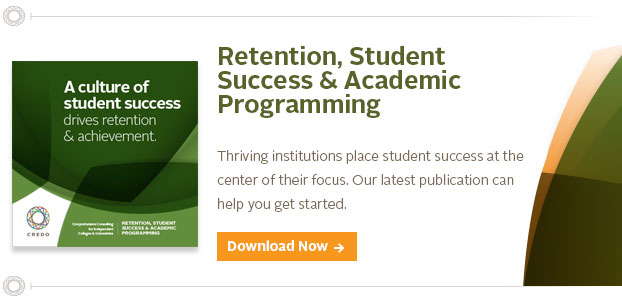
January 17 2017
College administrators and faculty want all students to thrive, but concern is greatest for those students who are most at risk to leave college before getting a degree. Such students are often termed “high risk” because their academic backgrounds or personal characteristics (for example, status as a first-generation college student) increase the likelihood that they will not be successful. Therefore, colleges target special programs toward these students, often requiring high-risk students to participate.
These programs go by different names – remedial education, developmental programs, success programs – but they all have the same purpose of helping high-risk students succeed. The problem is that they do not work.
Why Remedial Programs Fail
Colleges in the United States spend more than $2 billion per year on remedial education programming designed to help high-risk students succeed. Current efforts are not working, however, with some research even indicating that these programs are hurting high-risk students. Why do colleges continue to pour money into programs that are not working, and what can campus leaders do to make a difference for these students?
Perhaps what is needed is a paradigm shift – a shift in perspective from trying to get high-risk students to survive to one that aims to help them thrive. Research on high-risk students indicates that these students constantly battle negative stereotypes. These stereotypes (for example, “I’m less intelligent than the students around me”) create additional obstacles to the typical transition challenges that all students face. When students question their own abilities and feel a loss of control over their academic performance, they exert less effort, and research shows that effort (disciplined hard work) is one of the best predictors of grades.
But typical remedial programs do not address these psychological challenges. Instead, they mostly focus on study skills and other related behaviors. Often, we look at what high-achieving students do, turn to our struggling students and say, “You should do those things too!” In other words, remedial programs focus on behaviors, not beliefs, but it is students’ beliefs that drive their behaviors.
Helping High-Risk Students Thrive
What if we stopped trying to just teach the right behaviors and instead taught students the right beliefs? What if we taught students to think differently about themselves and their environment? The result could be a shift from surviving to thriving for our high-risk students.
So what exactly is thriving? When college students thrive, they not only succeed academically, but also experience a sense of belonging and a level of psychological well-being. Thriving contributes to their persistence to graduation in spite of obstacles along the way. Thriving also allows students to gain the most from the college experience. But in order to improve thriving, especially in high-risk students, we have to measure it first.
How to Measure The Success Of Programs for High-Risk Students
A student's ability to thrive academically is affected by a number of factors that can be measured- such as: engaged learning, academic determination, positive perspective, diverse citizenship, and social connectedness.By measuring thriving before and after students participate in campus programs, institutions can get a real sense of which programs are helping students to thrive so they can manage resources accordingly. To help high-risk studets succeed, institutions need tos top focusing so much on students' behaviors and start emphasizing the beliefs that drive those behaviors.
Student Success at Credo
What opportunities exist on your campus to support your high-risk students?  to learn how we can work together to create a customized solution that puts your intitution on the path to student success.
to learn how we can work together to create a customized solution that puts your intitution on the path to student success. 
by Rishi Sriram, Ph.D., Affiliate Consultant
Related Blog Posts
Recent Posts
- Richard Dunsworth, J.D., To Receive 12th Annual Courageous Leadership Award December 16 2024
- Meet the 2024 Credo Values Award Recipients August 27 2024
- What is Executive Coaching, Really? June 25 2024
- Credo & The Constructive Dialogue Institute Announce A New Partnership For Higher Education Leadership Development March 7 2024
- Celebrating Women And Gender-Diverse Learners & Leaders February 28 2024
Categories
- Strategy
- Leadership
- Student Success
- Student Success & Retention
- Enrollment
- Pivot
- Strategic Planning
- Leadership Development
- News
- Strategic Enrollment
- Campus Planning and Architecture
- Moving the Needle
- Data
- Research
- Retention
- Campus Master Planning
- Enrollment & Financial Aid
- Academic Programming
- Campus Planning
- Thriving
- Admitted Student Research
- Architecture
- Finance
- Advising
- Admissions



